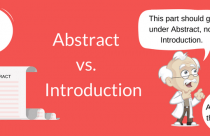Best Practices When Referring to Different Sections Within a Paper

Referring a reader to another part of your paper can be an effective way to tie together different parts of the whole paper and point them to places where they can review an explanation or move forward to read more details on a particular topic of interest. The goal is to acknowledge that you have discussed a topic earlier or allow the readers to anticipate reading further details about it later on in the paper. Since readers mostly move back and forth in the text looking for more information, it is important to offer a quick, simple reference for them to find the information they are looking for. This is particularly true for authors of lengthier works such as books or dissertations, or works that include a large number of examples, tables, or figures.
Using Numbers
A good way to inform readers that they should refer to a certain section of your paper is to number all the sections (and even subsections). This enables you to mention things like “As I discussed in Section 2…” or “See Section 5.7 for more details.”
Numbering tables and figure is the norm. It is also a good idea to number any examples for easy reference. Relying on phrases such as “this example” or “the example below” can be very confusing if there are multiple examples on the same page, especially if several examples appear immediately above and below the sentence.
Using Headings
Another strategy is to refer to sections by their names or headings. This is appropriate for cases when you choose not to number the sections of the paper or when you are following a style guide that does not use section numbers. For example, sections are not numbered in APA style. In this case, readers should be clearly informed where they can find the information. For instance, you might write “As found in the Literature Review…” or “This topic will be explained further in the Discussion.”
Avoiding Page Numbers
Do not mention page numbers as this will make the text incorrect if it is ever reprinted in a layout that changes the page numbers (e.g., different binding or page size) or if it is published online, where there are no page number. Consider the different forms of media in which the paper will appear.
Related: Need instant academic writing tips on your cell phone? Download the FREE Enago Academy mobile app now!
Avoiding Vague Phrases
Using vague phrases like “This will be explained later” does not help in informing the readers about where to find the information and hence should be avoided. If possible, try avoiding phrases that involve “above” or “below,” as in “See the section below.” These words point readers quite literally to a space above or below the sentence they are reading. If the book is printed in a way such that the information you are referring to appears on the previous page or the following page, it would not make sense for readers to look above or below.
However, it is acceptable to use phrases like “as mentioned” or “as I discussed earlier” if you are referring to something within the same section or to a broader theme that appears in the paper (not necessarily specific information in one section). This is appropriate when you are repeating information in order to lead into a new argument or line of thought, and would like to acknowledge that you are aware of the brief repetition. The goal when using such phrases is not to point the readers backward or forward in the text but to remind them of an argument for the purpose of developing the discussion. If you are in doubt, always consider whether it would help readers to have a fuller phrase like “as mentioned in the Introduction” or “as I discussed in Section 4.”









